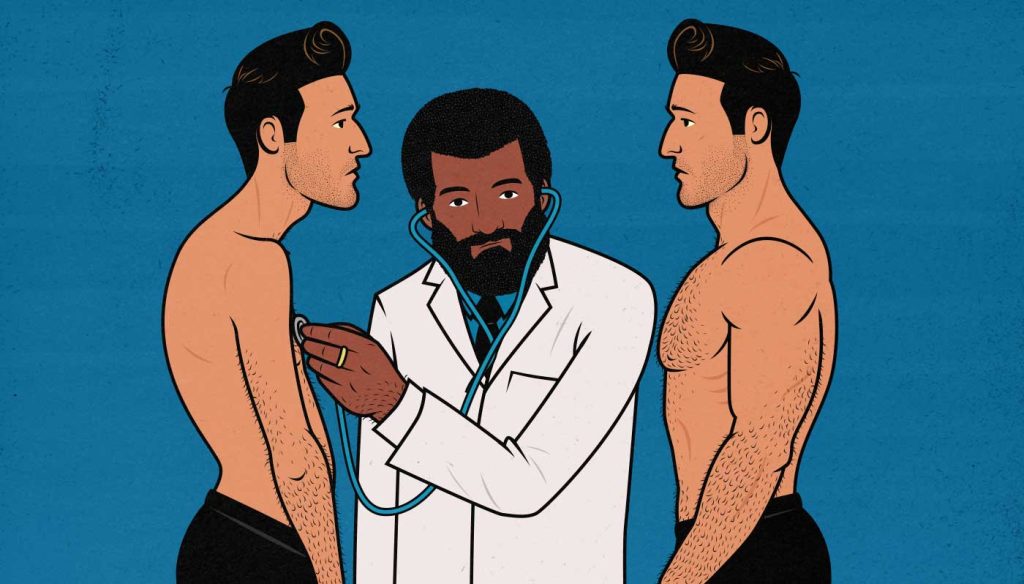
Is Bulking Healthy? Can We Make it Healthier?
Different people bulk in different ways, and so depending on how we approach it, it can be either good or bad for our general health. However, as a general rule, bulking involves habitual weight training, eating a lot of whole food, eating plenty of protein, getting an abundance of good sleep, and gaining muscle mass, all of which are incredibly healthy.
One of the main reasons that Marco and I are so passionate about helping skinny guys bulk up is because we’re so confident that it can profoundly improve your health, as it did for the two of us.
Still, there are some things to watch out for, as well as some things we can do to make bulking even healthier, so let’s go into more detail about how we can bulk up in a way that’s good for our general health.
Qualifications & Disclaimer: Marco has a degree in health sciences (BHSc) from the University of Ottawa, he’s certified to give exercise advice (PTS) through Canadian Fitness Professionals, and is certified to give diet recommendations (PN) through Precision Nutrition. Even so, this information should be used at your own discretion and in conjunction with the advice you get from a physician and/or registered dietitian.
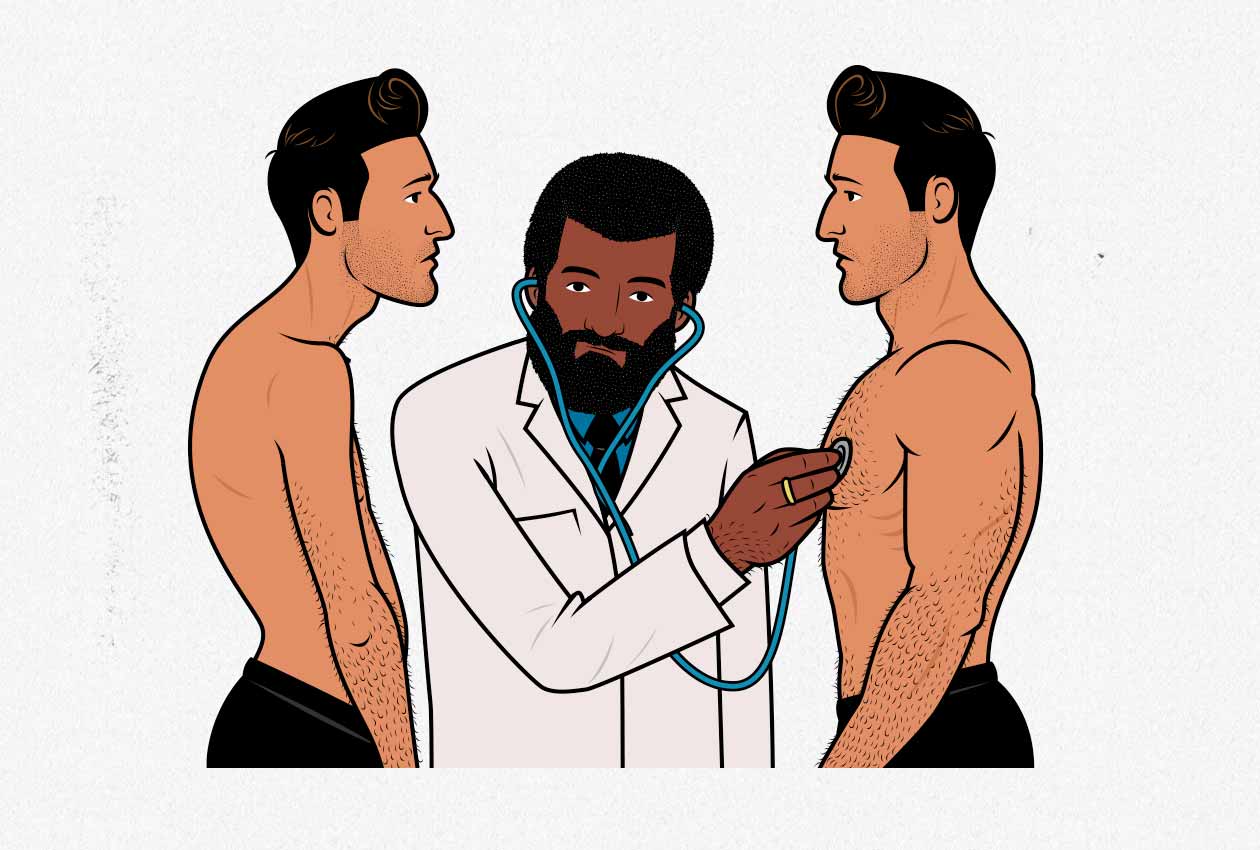
Is Bulking Healthy?
The short answer is that, yes, bulking tends to be healthy, especially for people who are underweight or weak, and especially if body-fat percentages are kept within the healthy range (under 20% for men). But if bulking leads to becoming overweight or obese, that can change.
The long answer is that bulking can be either good or bad for our health, depending on how we approach it. With exercise, bulking usually means routinely lifting weights, building muscle, increasing bone density, and becoming stronger, all of which are incredibly healthy. However, training recklessly can, in some cases, suppress the immune system or lead to injury. For lifting to be healthy, it needs to be done at least somewhat correctly.
Fortunately, of all the types of weight training, the type of training that’s best for bulking—hypertrophy training—is one of the safest and healthiest ways to train. Here are a few examples of that:
- Hypertrophy training is often done in moderate rep ranges (8–20 reps), which is great for both building muscle and improving our cardiovascular fitness.
- Unlike Olympic weightlifting and powerlifting, there are no specific competition lifts, allowing us to choose lifts that best suit our bodies.
- We can also choose lifts with lower injury risk, such as goblet squats and front squats instead of lifts that maximize leverage, such as low-bar back squats.
- Hypertrophy training is designed to improve our body composition, which is absolutely fantastic for our general health.
In addition to weight training, people often make significant improvements to their diets when they start bulking, cutting out junk food, eating more protein, and eating more whole foods. For instance, a typical bulking diet might involve eating more foods like:
- Oats, grains, and rice.
- Trail mix and nuts.
- Protein powder.
- Ground meat.
- Fruits.
- Milk.
That means more fibre, more micronutrients, more protein, and more overall energy, all of which can be profoundly healthy. It helps us build muscle, strengthen our bones, and ward off nutrient deficiencies. But there’s room for error here, too. If we gain too much fat or overdo our intake of certain foods, it can have a negative impact on our body composition and general health.
Finally, we often make a number of lifestyle changes when we start bulking, such as improving our sleep, increasing our daily activity, and spending more time relaxing, all of which can improve both our muscle growth and our general health. However, once again, this hinges on making the correct changes to our lifestyles.
However, there are also a few ways that bulking can be bad for our health:
- Bulking means eating more food—more total calories—which increases our risk of gaining fat. If our body-fat percentage rises too high—above 20% or so—that can be unhealthy.
- If we make poor food choices while overeating, such as getting too many excess calories from processed saturated fat, it can cause us to store a disproportionate amount of visceral fat, which can be bad for our health. However, there’s some nuance to this, and it’s hard to know exactly how much is too much.
- If we train recklessly, we can accumulate aches, pains, and injuries, which can make it harder to remain active as we age. If the exercise we’re doing today prevents us from exercising tomorrow, that’s a problem. However, there’s some nuance here, too. Lifting weights correctly can rehab old injuries and prevent new ones by strengthening our muscles, toughening our connective tissues, and hardening our bones.
- It’s possible to train so hard that we suppress our immune systems or even get rhabdomyolysis. This is quite rare, as a general rule, exercise tends to improve our immune systems (study, study, study), but it’s still important to lift weights at least somewhat correctly.
To quickly summarize, bulking can absolutely improve our general health, and it usually does, especially for people who are sedentary, skinny, underweight, or weak. But some ways of bulking are healthier than others, so it pays to do it properly.
The Health Benefits of Muscle & Strength
The most obvious health benefit of bulking is that we gain more muscle and strength. A recent study found that 70% of people aren’t doing enough resistance training to maintain good health, and so training in a way that builds bigger and stronger things is one of the very best things we can do.
Any type of strength training, hypertrophy training, or bodybuilding is good enough to increase our muscle strength and health, but when we’re bulking, there’s even more emphasis on gaining lean mass, which comes along with extra health benefits. Some of the lean mass we gain comes from tougher connective tissues and denser bones, which is great for reducing our risk of injury, but most of it comes from gaining muscle. Having more muscle directly improves our strength—a bigger muscle is a stronger one—and reduces our risk of heart disease, cancer, and dying for any reason whatsoever (study, study, study).
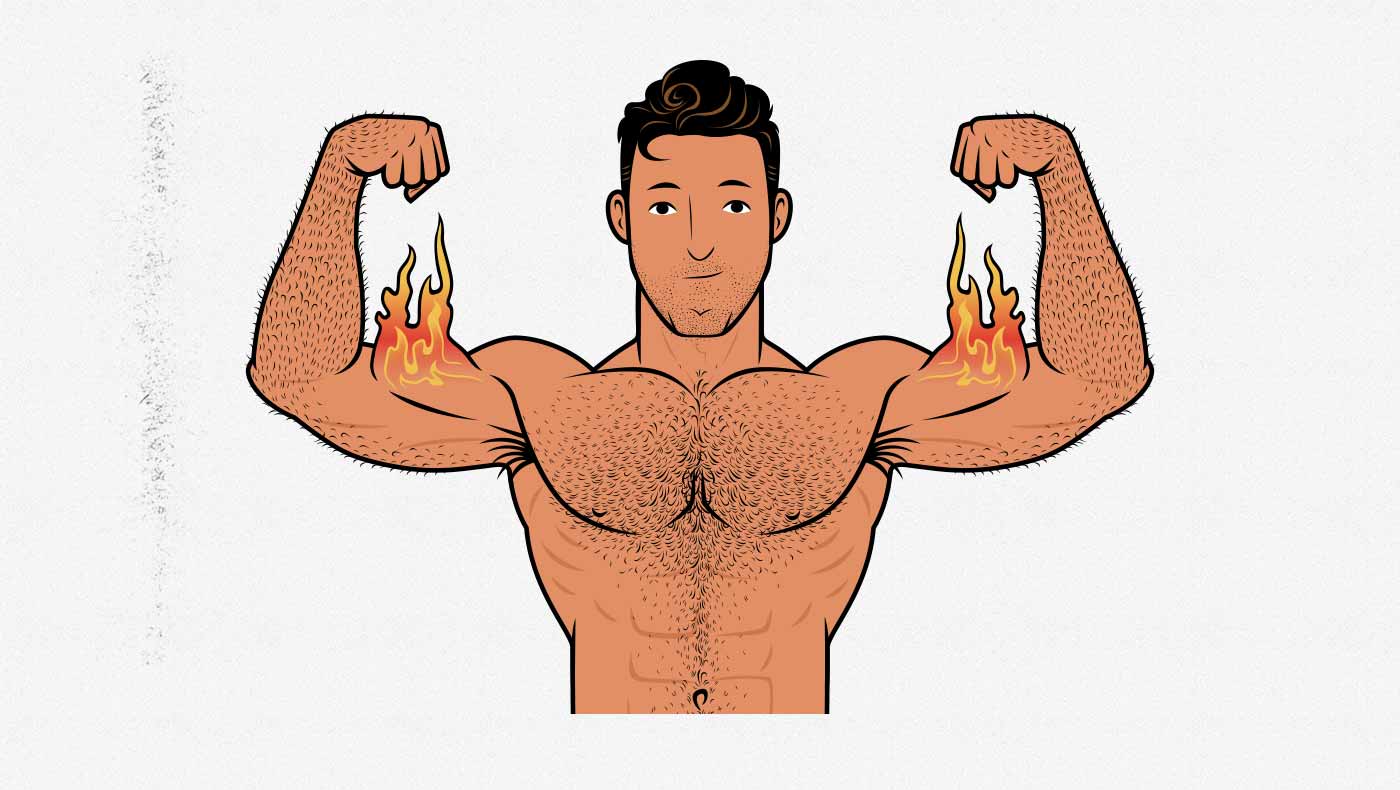
There are a few reasons why having more muscle mass is so good for our general health (study):
- Having more muscle mass reduces our blood pressure, and lowers LDL cholesterol and triglycerides.
- Having more muscle mass improves our insulin sensitivity, helps us clear sugar from our blood, and reduces overall inflammation.
- The more muscle we have, the higher our overall metabolism rises. Each pound of muscle burns around six calories per day at rest, plus the calories needed to lug it around. This gives us a higher energy flux (g-flux), which has a number of different benefits.
- Having more muscle mass is linked to having better cardiovascular fitness (study).
- And, as mentioned above, bigger muscles are stronger muscles. The stronger we are, the more capable we are, the better we age, and the longer we live.
As we become stronger and more muscular, our health improves in virtually every way imaginable. A study from Harvard Medical School found that push-ups “were an even better predictor of cardiovascular disease than a submaximal treadmill test.” These findings have been replicated using different measures of strength, such as grip strength (study). And on the note of grip strength, men with stronger grips tend to live longer in general (study, study).
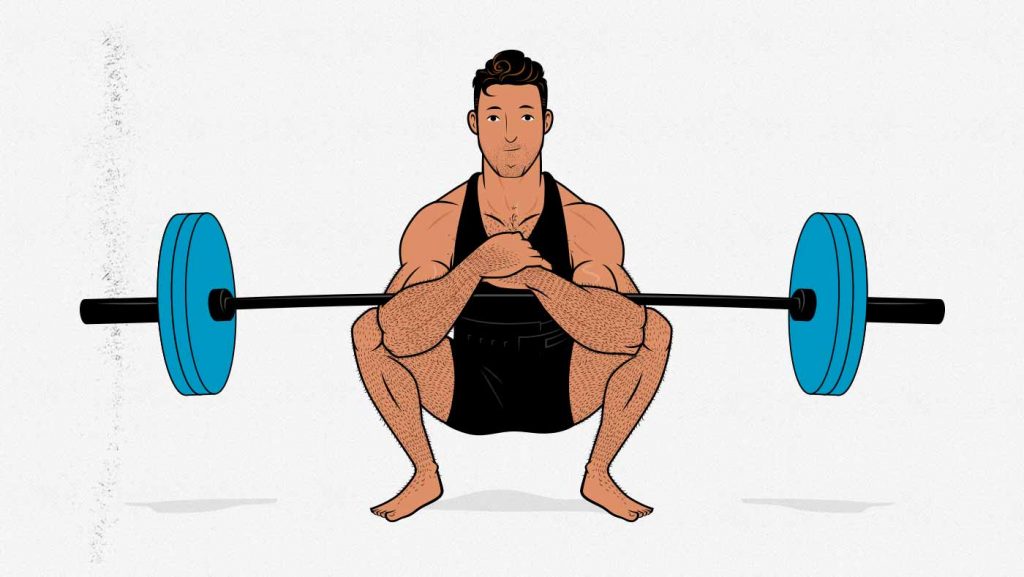
Now, to be clear, these studies don’t show us whether good health makes us stronger or whether being stronger improves our health. After all, it could be that once people near the end of their lives, they lose muscle mass and their grip gets weaker. But even if we factor that out, it still seems like becoming stronger has a massive positive impact on our health and longevity.
This is all to say that to improve our health, we should follow a strenuous workout routine that helps us gain muscle size and strength. Strength training can certainly help, but if you’re a skinny guy who’s interested in getting bigger and stronger, we recommend hypertrophy training.
The Health Benefits of Regular Exercise
The second health benefit of bulking is from consistently following a workout routine. After all, a good bulking program will recommend that you lift weights at least twice per week, which just so happens to be what is officially recommended by both the American Heart Association and the American College of Sports Medicine, as well as virtually every other major health organization and expert.
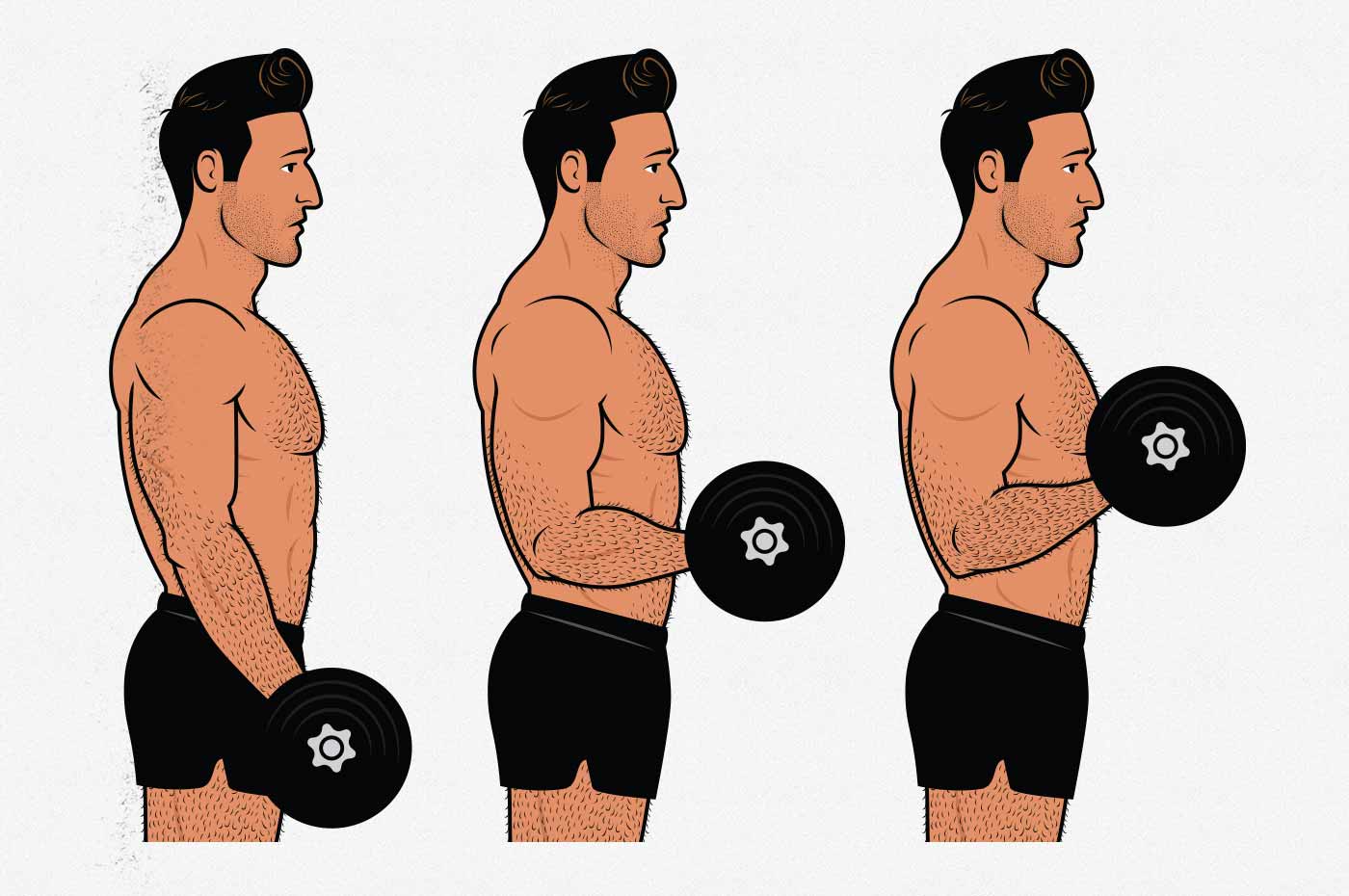
Lifting weights is good for our health for a few reasons:
- Strenuous weightlifting is great for the health of our brains, promoting brain adaptation and growth, and improving our brain function (study).
- Weight training improves our cardiovascular and cardiorespiratory fitness, especially when doing bigger compound lifts like the squat, the conventional deadlift, the overhead press, and the chin-up, especially when lifting in moderate to high rep ranges, and especially when using shorter rest times.
- Exercise is one of the very best ways to improve our blood pressure (ACC/AHA guidelines, meta-analysis). To quote Examine, “All types of exercise seem to reduce systolic blood pressure, especially in people with hypertension, where exercise seems to do just as well as drugs.”
- Doing three or more weight training workouts per week reduces our overall levels of inflammation (study).
- Routine resistance training reduces arterial stiffness, improving our cardiovascular health (study).
- Lifting weights improves our strength and posture.
- Heavy lifting increases our bone density and connective tissue strength.
- Lifting with a large range of motion is one of the most effective ways to improve both our flexibility and mobility.
There’s no real downside here. Lifting is incredibly healthy. However, that doesn’t mean that we shouldn’t also be doing cardio. So how should we integrate the two forms of exercise together?
There’s research showing that lifting weights can raise our heart rates high enough to give us similar benefits to dedicated cardio training. The catch is that the average bodybuilding workout only raises our heart rate high enough to provoke cardiovascular adaptations for about half of the workout. So lifting weights for an hour only counts as doing thirty minutes of cardio.
We could keep our heart rates higher by focusing on the big compound lifts and using strict rest times, but even then, it’s probably wise to do some dedicated cardio while bulking. Most health experts recommend around 150 minutes of cardio per week, with Harvard Medical School recommending “thirty minutes, five days a week.”
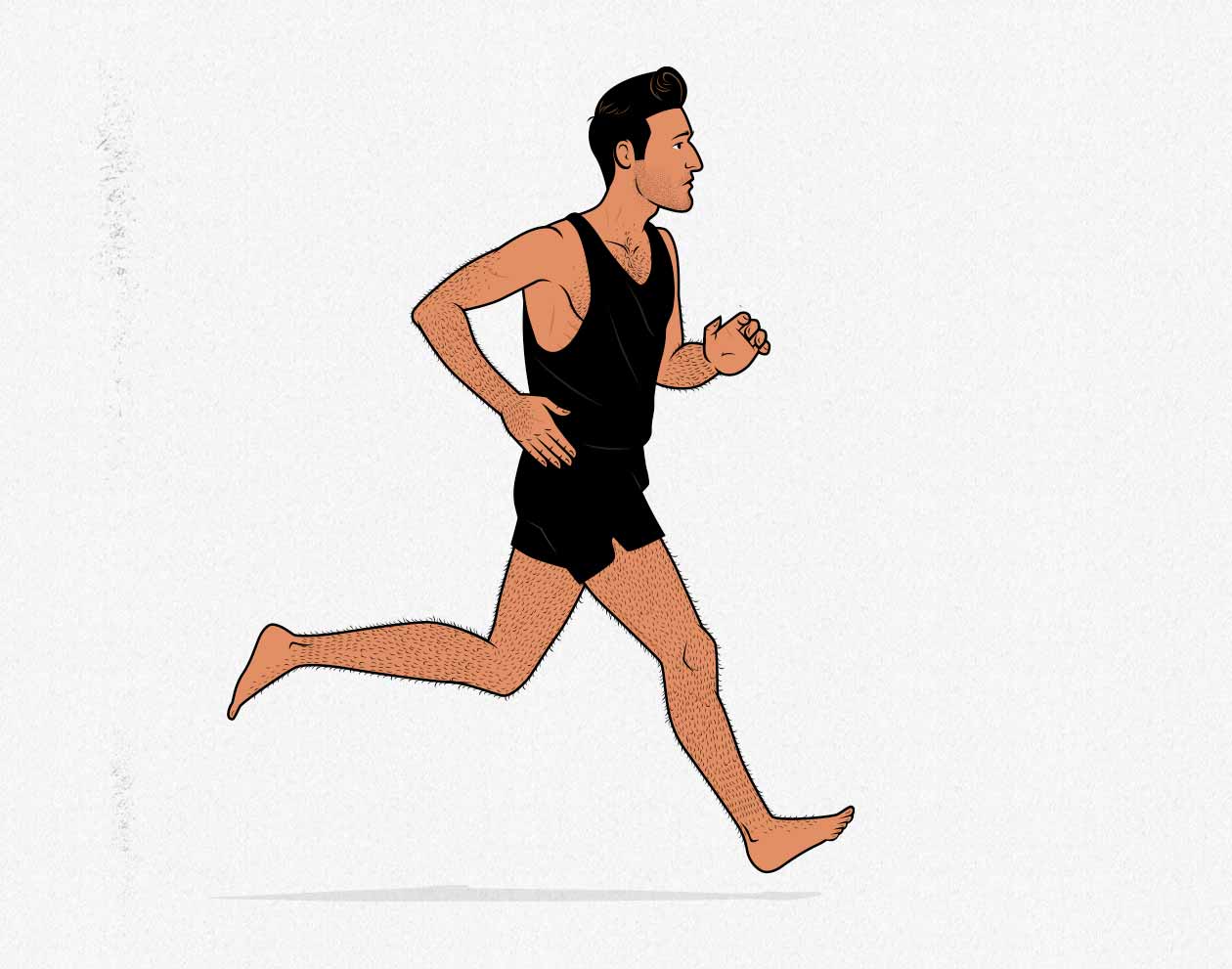
Putting this information together, if we’re lifting weights five days per week, with each workout lasting about an hour, then we’re probably getting enough cardio. A more well-rounded approach, though, could be to lift weights three times per week along with two thirty-minute steady-state cardio workouts. That way we’re including both strenuous weight training along with some lower intensity cardiovascular exercise.
If you’re new to exercise or if your bulking routine is tiring you out, keep in mind that steady-state cardio includes fairly casual exercise, such as going on brisk walks outside, going for a swim, or playing pick-up games of basketball.
To summarize, weight training has a number of positive impacts on our health. Some of those benefits are unique to weight training, and other benefits are because weight training has some overlap with cardio. However, for the best health improvements, we probably want to do at least a couple of cardio workouts per week, even if it’s something casual like going on brisk walks outside.
The Health Benefits of Eating a Better Diet
It’s common for people who are new to bulking go through a phase of eating a restrictive diet. The specific restrictions vary. Maybe we’re avoiding carbohydrates for fear of gaining fat, avoiding sugar for fear of inflammation, worried about the fat in yogurt, skipping breakfast to boost growth hormone, or tossing the yolks from our eggs to get rid of the dietary cholesterol. (Note that I’m not including plant-based diets here, which are often adopted for ethical reasons.)
When I first started bulking, I went through that restrictive phase, too, and in some ways, it even helped. Even though my restrictions didn’t make a whole lot of sense, I wound up eating more whole foods, more protein, more fruits, more veggies, and fewer processed junk foods. Did I need to avoid sugar? No. But my diet improved nonetheless.
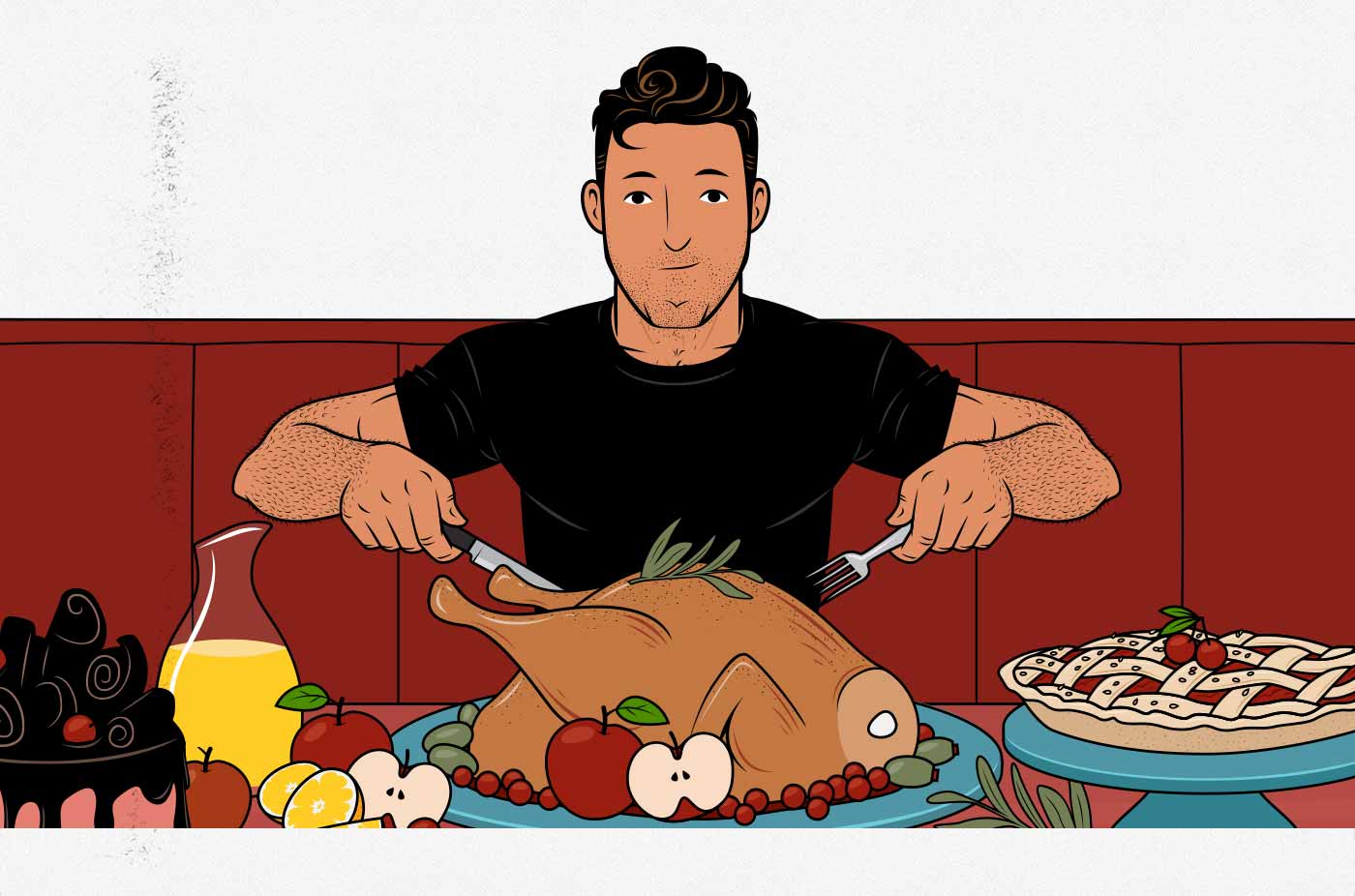
If your goal is to improve your general health while bulking, you don’t need to avoid any specific food or macronutrient (unless you’re allergic to it, hate it, or find it morally objectionable). When we talk about eating a good diet, we aren’t trying to imply that we need to drastically reduce our sugar intake or eat in an extreme way. Most experts are in agreement that a healthy bulking diet looks something like this:
- Around 80% of calories from minimally processed whole foods. Now, I realize that “minimally processed” is vague. Some foods are clearly unprocessed, such as fruits, veggies, and nuts. Other foods are minimally processed, such as oats, white rice, milk, yogurt, dark chocolate, and whey protein. And then there are fully processed foods like weight gainers, protein bars, sodas, canola oil, and potato chips. This puts things like homemade apple pies in a sort of grey area. Don’t overthink it.
- Around a gram of protein per pound bodyweight per day. For example, a 150-pound guy would eat 150 grams of protein per day. Ideally, this would come from a variety of protein sources, ranging from whey protein to meat to legumes. This has been shown to lead to healthier ageing, better overall health, better athletic performance, greater strength, and better body composition (study). Higher protein diets also help to improve our cardiovascular fitness when combined with regular exercise (study).
- A reasonable calorie surplus that doesn’t cause our body-fat percentage to skyrocket. 250–500 extra calories per day is usually a good place to start, and then the surplus can be adjusted based on our results.
- Plenty of carbohydrates, including both carbs that are rich in fibre as well as carbs that are easy to digest. Eating a diet that’s rich in carbs (2–4 g/lb body weight) has been shown to help people build muscle more quickly and leanly (study), and some carb sources, such as oats, seem to be especially good at improving our cardiovascular and overall health (study, study).
- A few servings of fruits and vegetables per day. As always, a variety of different varieties and colours is great. Almost every fruit and vegetable has an impressive list of health benefits.
- Around ten grams of fibre per thousand calories. Diets that are higher in fibre (29+ grams per day) improve health markers and reduce our risk of developing non-communicable diseases (study).

However, as always, there’s nuance here. For example, one of the reasons that we don’t need to worry much about our sugar intake is because we’re lean people who routinely exercise. We’re able to clear the sugar from our blood and then feed it to our hungry muscles. Things are different for people who are sedentary, obese, and fighting to reduce their risk of getting diabetes. Context always matters. This is why it can be wise to talk with your doctor.
For a personal example, I inherited familial hypercholesterolemia, so, based on the advice of my cardiologist, I try to get more of my dietary fat from seafood and nuts when bulking. He also recommended getting more of my calories from carbs and eating more oatmeal, legumes, fruits, and veggies. Then, after doing a series of tests on my father, it seems like krill oil improves his blood markers more than fish oil does, so I’ve started supplementing with that as well.

In my own case, I’ve managed to significantly improve my overall health markers while gaining sixty pounds. In fact, after confirming my blood test at three different labs, my cardiologist told me that I’ve had the most dramatic health transformation he’s seen in his entire career. Thing is, some of this advice is specific to me. Different people have different issues to manage.
Still, as skinny “hardgainers” or “ectomorphs” who are trying to bulk up, some of our circumstances to one another. For example, one of the reasons most of us skinny guys can eat dessert without fear of running into vitamin deficiencies is because bulking means eating more overall food, and with all of this extra food we’re eating, we’re getting more overall nutrients. That’s one of the reasons why bulking can be so healthy. We’re getting an abundance of energy and nutrients.
What’s neat is that almost every minimally processed food has a slew of health benefits associated with it; cherries improve our sleep, blueberries improve our mood, turmeric reduces inflammation, spinach boosts workout performance, oranges assist our immunity, carrots improve our skin, oats help manage blood lipids, and the list goes on.
To summarize, eating good food is healthy, and bulking means eating an abundance of good food.
The Health Benefits of Better Sleep
Not everyone who gears into a bulking routine tries to improve their sleep, but they should. Improving our sleep has a number of proven benefits (study):
- Getting enough sleep raises testosterone: getting enough sleep boosts our circulating levels of testosterone, improving our ability to gain muscle quickly and leanly.
- We produce more insulin-like growth factor 1 (IGF-1): getting enough sleep will also raise our IGF-1 levels, allowing us to better recruit satellite cells into our muscle fibres, which is critical for overcoming size and strength plateaus.
- Our cortisol levels go down: getting enough sleep reduces chronic cortisol levels, reducing muscle breakdown and increasing muscle growth.
- Chronic inflammation goes down: getting better sleep reduces chronic inflammation, speeding up muscle repair, reducing our risk of injury, and improving our general health (study).
- Our workout performance improves, giving us more drive and muscular endurance when lifting weights (study, study).
- We gain less fat while bulking: getting enough sleep makes our bodies prefer getting stored energy from fat instead of muscle, allowing for leaner muscle gains.
- We build muscle much faster. Improving our sleep has been shown to increase gains in lean mass by around 30% (while simultaneously reducing fat gain).
For example, this study assigned half of the participants to just a weight training program, whereas the other group was also taught how to improve their sleep. The group who learned how to improve their sleep gained around 30% more lean mass:
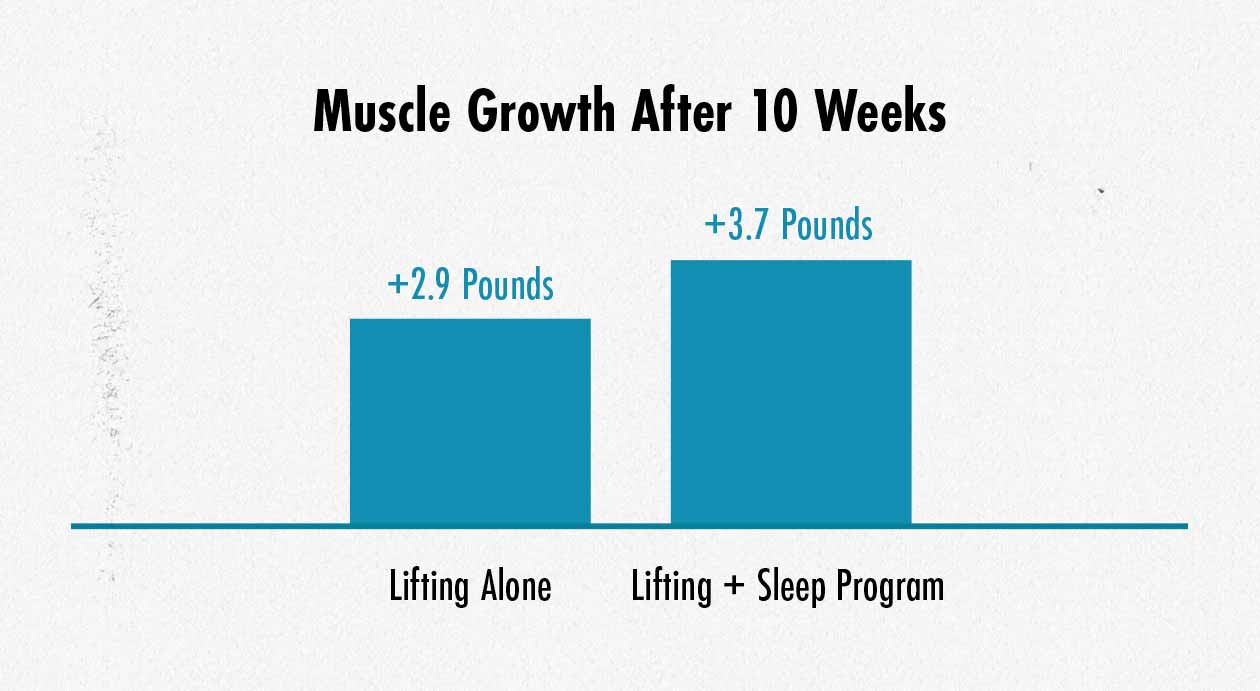
That’s not even the coolest part of the study. If we look at what happened to their body fat, we see that the participants who were taught how to get better sleep lost fat while building muscle, improving their overall body composition to a much greater extent than the group who just lifted weights:
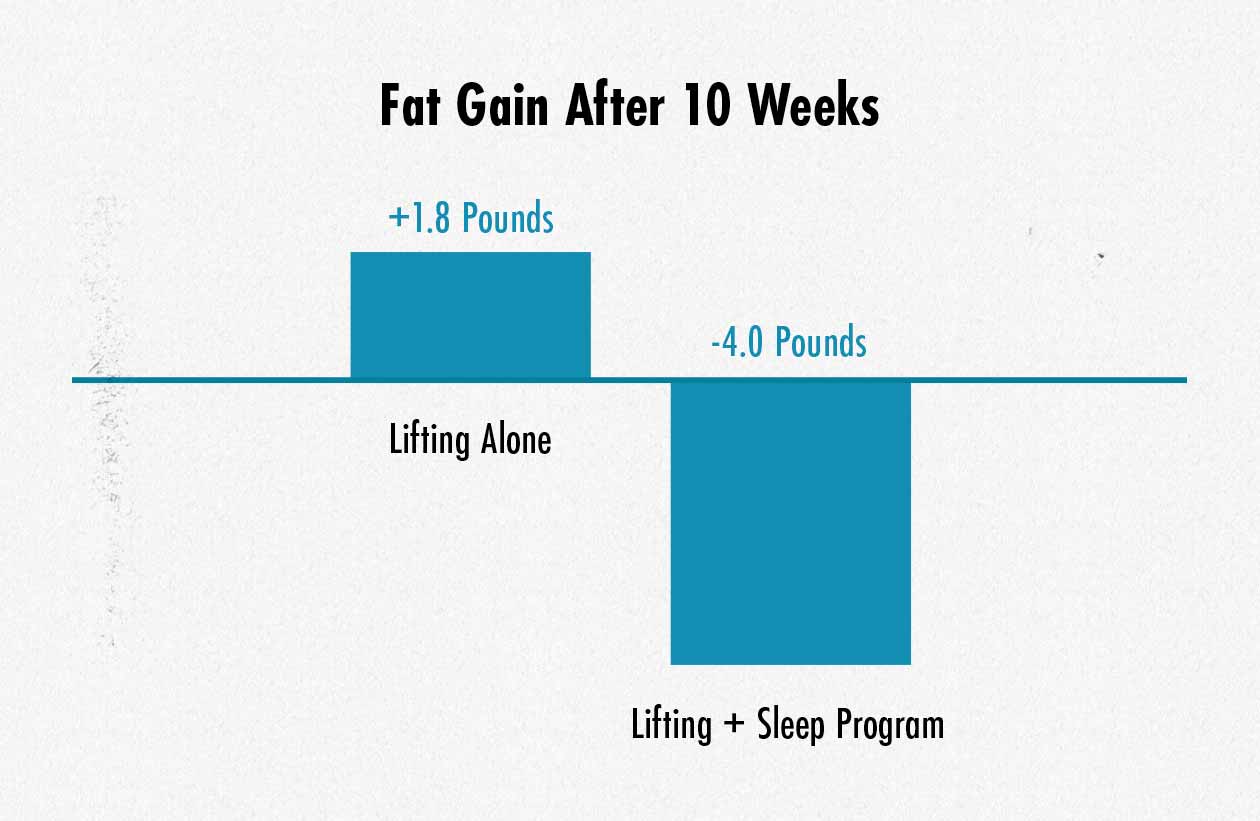
What we’re seeing is that weight training combined with sleep optimization leads to better nutrient partitioning and body composition changes while bulking, which is healthy in a number of different ways.
To make things even better, lifting weights has also been shown to improve our sleep (meta-analysis):
- Weight training helps us fall asleep faster.
- We wake up less often during the night.
- We have more energy during the day.
- Our mood is better during the day.
- We feel calmer and more relaxed.
To summarize, getting better sleep improves our workout performance, working out improves our sleep, and a good workout program combined with good sleep yields faster and leaner muscle growth. So both of these interventions have profoundly positive impacts on our health, and they synergize.
Can Bulking Be Unhealthy?
Does Caloric Restriction Increase Lifespan?
One of the more common questions we get is about the potential anti-ageing effects of caloric restriction. Our expertise is in helping people improve their strength, fitness, and body composition, so this question is well outside our area of expertise. However, Examine has written about it in their research review (NERD), and I can quickly summarize their findings.
The first idea is that eating less food causes us to lose weight and our metabolisms to slow, which leads to a longer lifespan. This is called the rate of living theory of ageing. It would follow, then, that if we’re eating more calories, gaining weight, and raising our metabolism, then we’d be shortening our lifespans, right?
This is tricky because caloric restriction leads to fat loss, which is extremely healthy for overweight people. So we need to separate out the benefits of dieting down to a healthy body-fat percentage versus slowing our metabolisms. After all, in someone who’s already lean, calorie restriction causes our metabolisms to slow because our activity levels drop and our bones, muscles, and organs shrink (study). The effect is quite different.
There’s some good research linking caloric restriction with longer lifespans, but most of it is in animals, and it only works with certain animals. If we look at the research on humans, though, the effect disappears entirely (study). I’m not sure the hypothesis has been completely disproven, but it seems that most experts no longer consider it promising.
The second idea is that eating less reduces the amount of oxidative stress on our bodies. This is called the free radical theory of ageing. There’s some research showing that lower amounts of oxidative stress can be healthy (study, study) but there’s also research showing that oxidative stress can cause us to adapt, making us healthier and increasing our lifespans (study).
Some calorie-restriction studies do show small reductions in oxidative stress, but others don’t. For instance, a two-year study looking at the effects of reducing calories by 25% with an intermittent fasting protocol found no reductions in oxidative stress.
Finally, we need to consider the opportunity cost. After all, there’s an abundance of research showing profound health benefits from lifting weights, building muscle, building denser bones, and gaining strength. We’d be missing out on all of that.
Being overweight can certainly be unhealthy, and eating fewer calories is a sure way to solve that problem. But beyond that, there’s currently no research to suggest that calorie restriction leads to a longer or healthier lifespan.
How Fat is Too Fat When Bulking?
The main way that bulking can be unhealthy is if it causes our body-fat percentage to rise too high. If our body fat percentage climbs higher than around 20% or our waist circumferences pass 37″, it can begin to have a negative impact on our health (study, study, study). There are a few reasons why a high body-fat percentage can be unhealthy, especially when that fat is accumulating in our guts:
- It suppresses testosterone and increases estrogen (study).
- It increases stress and anxiety (study).
- It raises the risk of developing diabetes (study).
- It increases the incidence of cardiovascular disease (study).
- There’s a greater risk of having a heart attack (study).
- It can be hard on our joints (study).
- Our fertility can suffer (study, study).
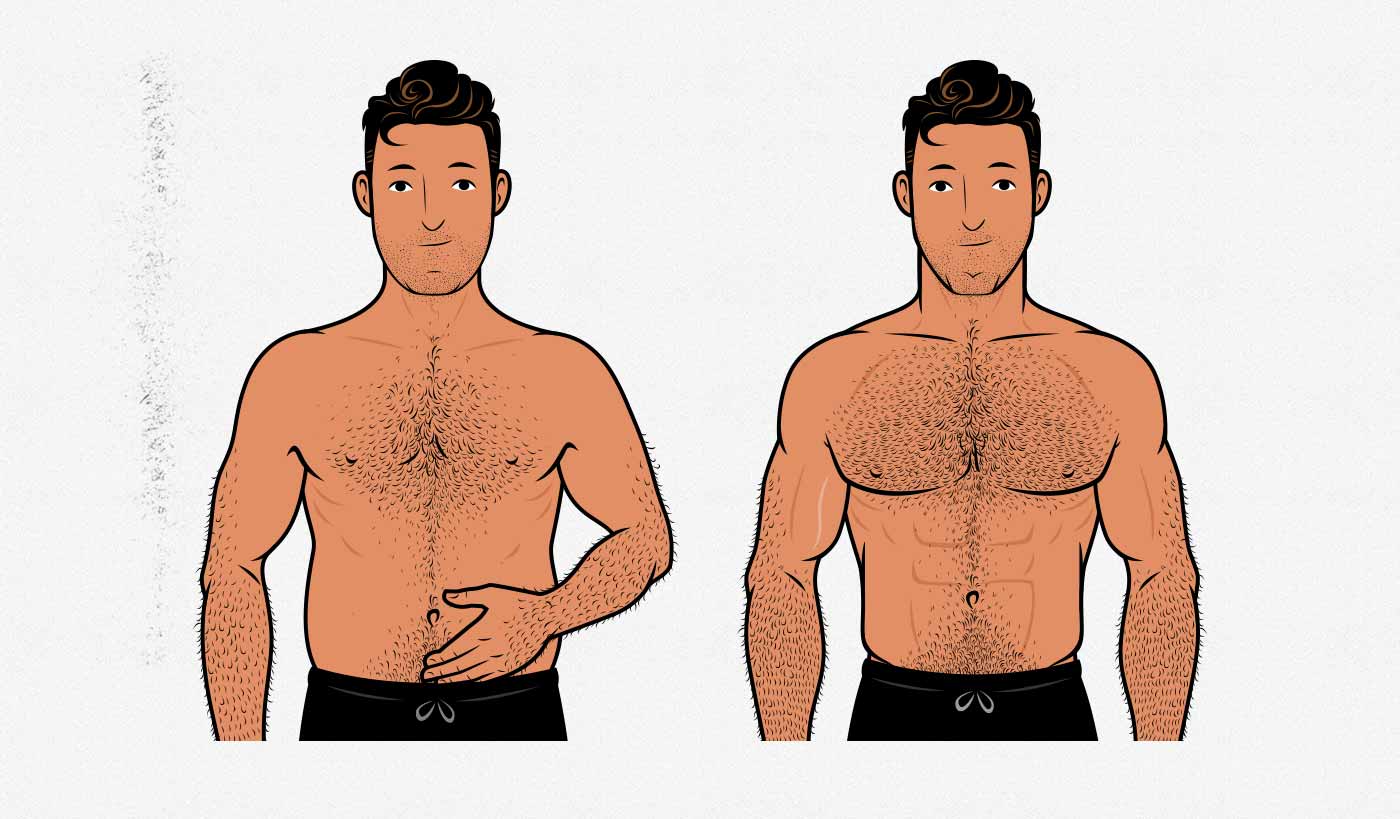
The main reason that people gain fat while bulking is that they eat too many calories, causing them to gain weight too quickly, and causing the excess calories to be dumped into fat storage. There are a few other reasons that people gain too much fat while bulking, though:
- Not following a good hypertrophy training program. When you’re actively gaining weight, and especially if you’re gaining weight quickly, it’s usually best to specifically train for muscle growth. That way more of the weight we’re gaining is lean.
- Not working out often enough. Lifting 3–5 times per week is usually ideal.
- Not training hard enough. In order to stimulate muscle growth, we need to bring our muscles within a couple of reps of muscular failure.
- Not eating enough protein. Getting about a gram of protein per pound bodyweight per day is best.
- Not getting enough quality sleep. As we discussed above, optimizing our sleep improves nutrient partitioning, increasing muscle growth and reducing fat storage.
- Eating too much fat. We tend to gain muscle more leanly when our diets are higher in carbohydrates and lower in fat (study).
By following a good hypertrophy training program, eating a good bulking diet, getting proper sleep, and gaining weight at a reasonable pace, we can minimize the amount of fat we gain while bulking, which will make it better for our general health.
If bulking makes us fat, it can be unhealthy. But keep in mind that fat gain is completely reversible. We can get rid of the fat we gain at any point, and long before it ever starts to negatively impact our health. Best to avoid fat gain when possible, but there’s little need to fear it.
Are Fructose & Saturated Fat Unhealthy?
Most people gain too much fat while bulking simply because they’re bulking too quickly. If that’s not the reason, it’s probably because they aren’t following a good enough hypertrophy training program. If that’s not the reason, I’d look at protein intake. After that, overall activity levels, sleep, and stress. After ruling all of that out, maybe it’s time to consider carb and fat macros, micronutrient intake, and overall food choices. At the bottom of the list are things like sugar and saturated fat intake.
Fructose & Fat Gain
The first concern while bulking is that if we raise our fructose too high, it’s technically possible for it to increase our body-fat storage even if we’re doing everything else right (study).
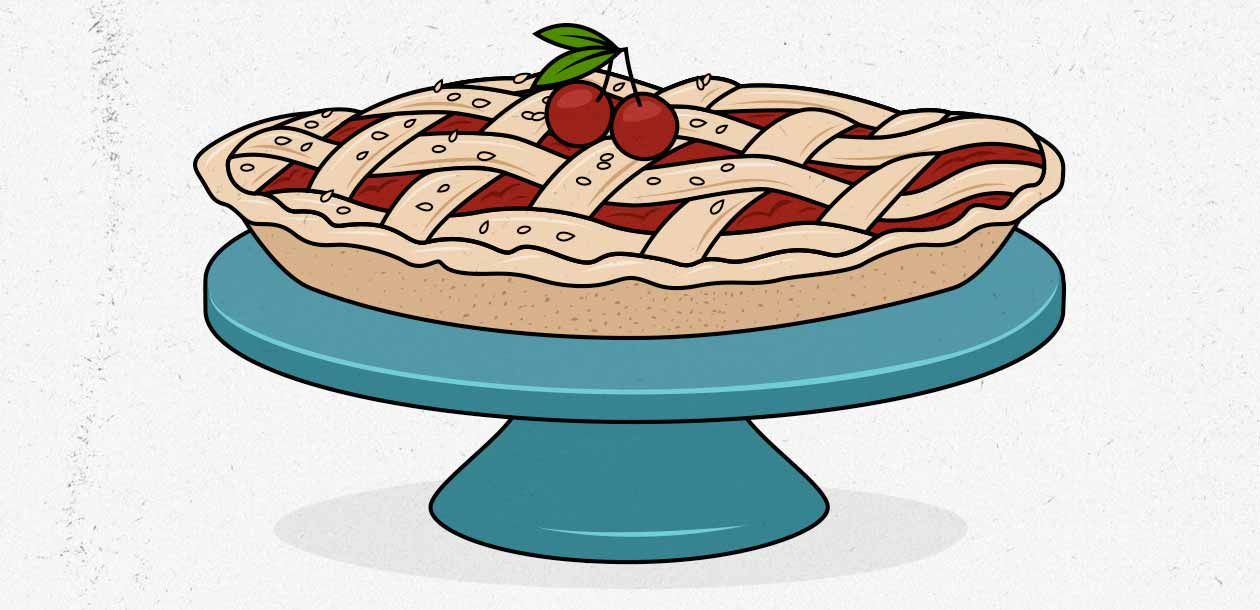
However, our diets would need to be rather horrific for that to become an issue. Most of us aren’t drinking a gallon of soda per day, and so it’s not something we really need to track. And even then, fairly high intakes of fructose don’t seem to cause much of a problem in otherwise healthy people (study). Plus, being lean and engaging in regular exercise seems to improve our ability to handle large amounts of sugar anyway. So although we recommend limiting sodas and sweets to 10–20% of our overall calorie intake, it’s unclear if exceeding that limit would cause any detectable harm, and there’s likely no need to limit things like fruit juice, let alone fruit.
So with fructose, instead of trying to limit it, it might be more helpful to think of ways to add in minimally processed fruits, starches, and vegetables into our diets. Instead of pounding back extra soda or donuts, adding extra fruits, grains, rice, legumes and so on. Even fruit juices shouldn’t be a problem in the context of a healthy diet and lifestyle, though, and juice can make for an easy source of extra calories. For instance, cranberry juice is a popular juice for people to drink while trying to bulk up, and that’s probably perfectly fine.
Saturated Fat & Fat Gain
Saturated fat is often thought of as the “bad” fat, which isn’t quite the right way to think of it. After all, if we consume too little of it, it seems to have a negative impact on our hormones. For instance, when Dorgan et al compared people getting 4.4% of their calories from saturated fat against people getting 14.7% of their calories from saturated fat, they found that the participants consuming more saturated fat produced 13–15% more testosterone.
However, we have other research specific to bulking, showing that gaining weight while eating a diet higher in saturated fat can cause us to gain less muscle and more visceral fat, which accumulates around our organs (study). So it’s not that saturated fat is bad, it’s that consuming too much saturated fat could be bad.
Thing is, it’s not that uncommon for people to consume massive amounts of saturated fat while bulking. For example, there’s a popular bulking diet called where people drink a gallon of whole milk a day (GOMAD). Whole milk is high in saturated fat, and so consuming extreme amounts of milk can raise our saturated fat intake extremely high. Our saturated fat intake could also go way up if we drastically increase our intake of fatty ground meat—another popular bulking food.
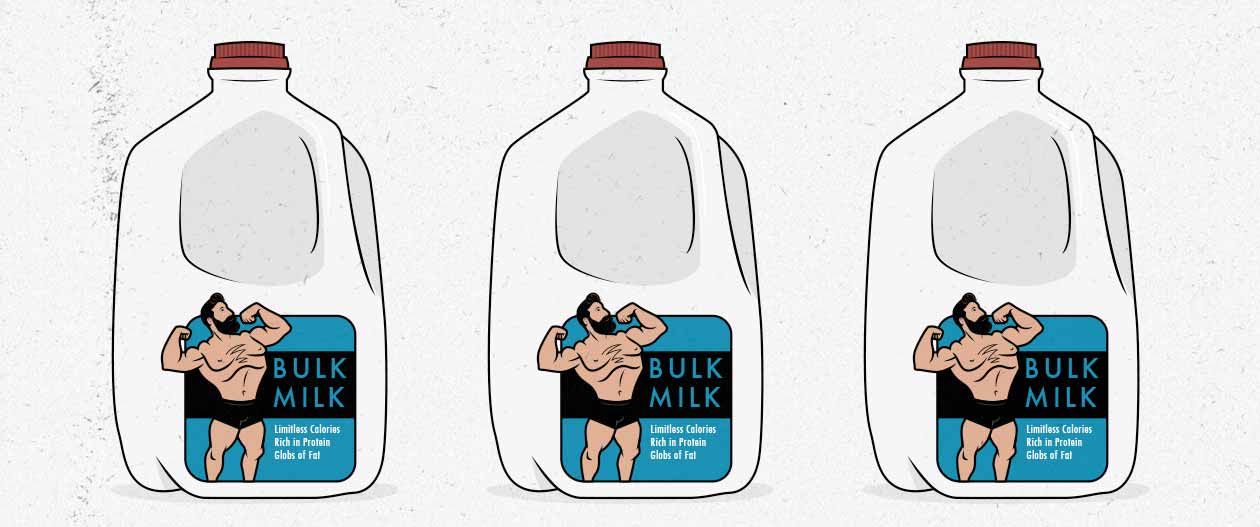
However, the harms of saturated fats are more strongly linked with processed saturated fats (study). Most studies finding harm in saturated fat are looking at palm oil, which is quite processed and mostly composed of palmitic acid. To quote the researcher Jason Cholewa, “Compare that to beef, which is a mix of palmitic, stearic and some other fats. In terms of blood lipids, there is a difference in effects.” That’s why studies looking into the health effects of full-fat cheese and yogurt generally find more benefit than harm. Furthermore, bulking involves strenuous weight training, which improves our heart health and reduces our storage of visceral fat (study).
Plus, most of these harms to our general health are coming from an increased amount of visceral fat. Visceral fat accumulates in our waists, so it’s something we can quite easily keep track of. A study published in Nature found that if we keep our waists 37″ or smaller, there’s no detectable negative impact on our general health. With that said, there’s one fairly large systematic review that found that if people who had a healthy BMI (under 25) swapped out some of their saturated fat with polyunsaturated fat, it had a better impact on their general health than it did on obese people. So it may be that because people with a lower BMI are already healthier, we get to experience more of the benefits of eating a diet lower in saturated fat.
Plus, there are quite a few studies showing that simply replacing saturated with polyunsaturated fat, monounsaturated fat, or fish oil can cause more muscle growth and less fat storage (study, study, study, study, study). With all of this research taken into consideration, the current recommendation for building muscle as quickly and leanly as possible is to keep saturated fat to under 10% of total calorie intake (study). Fortunately, this recommendation also lines up perfectly with general health recommendations (study). However, instead of counting calories from saturated fat, it might be wiser to simply focus on getting less of our calories from processed meats, oils, and junk food, and more of our calories from minimally processed whole foods. That way even if we’re consuming saturated fat, it’s not the heavily processed variants.
So, where should we get our dietary fat when bulking? We have one study showing that adding nuts and olive oil into a diet improves health markers. Eating more nuts, trail mix, and drizzling olive oil on our foods is a pretty easy way to boost our calorie intake in a healthy way. But we also have research showing that eating more full-fat yoghurt and cheese has a neutral or positive effect on our health (study, study). The same is true with eggs (study). And the fat found in fish tends to be quite healthy as well. That doesn’t mean that we should avoid other sources of fat, but for the extra calories that we intentionally eat to drive ourselves into a calorie surplus, it might be healthiest to focus more on nuts, olive oil, yoghurt, cheese, eggs, and fish (study).
To summarize, if you’re trying to improve your health while bulking, a restrictive diet isn’t required, but it may still be wise to get around 80% of your calories from minimally processed foods. Here’s our article about how to eat more calories, and here are some good bulking foods to get your extra calories from.
Is Weight Training Dangerous?
The final way that bulking can be bad for our health is if we train recklessly. Most of us know that if we lift weights carelessly, our risk of injury can go up. However, it’s also possible to simply do too much too soon.
When we first start seriously lifting weights, our muscles aren’t used to the stresses of lifting yet, and so they have tremendous potential for rapid growth. But that sensitivity is a double-edged sword. It’s possible to cause such an excessive amount of muscle damage that we cripple ourselves for days and suppress our immune systems. That isn’t unhealthy in the longer term—we adapt to the stress—but it can certainly cause problems in the shorter term, such as making us more likely to catch a cold. And it’s uncomfortable.
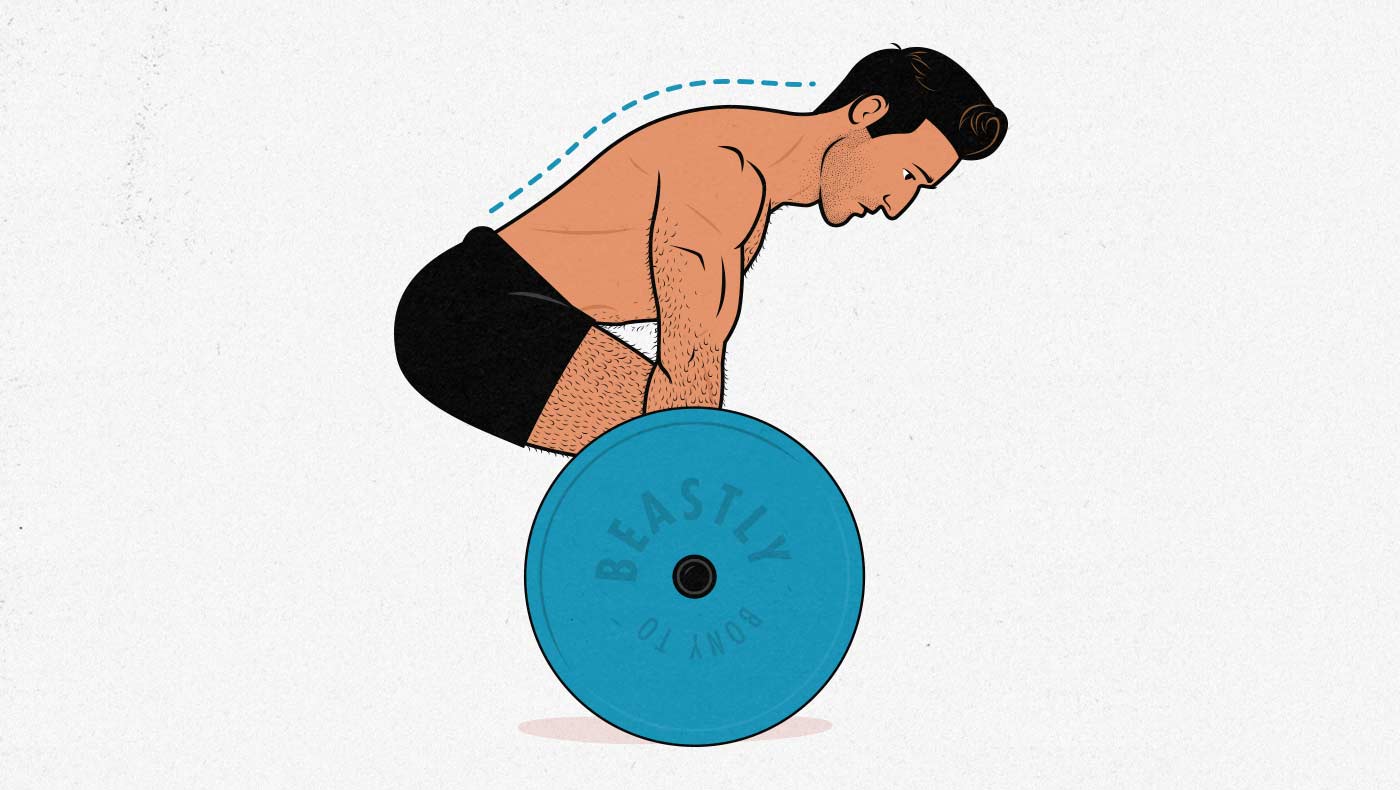
More importantly, we want to make sure our training has a positive long-term impact on our joints, bones, and connective tissues. We want to make smart exercise choices and lift with good technique. Here are some examples:
- As a general rule of thumb, it’s often wise to stop our sets 1–3 reps shy of failure. We stimulate just as much muscle growth, but the sets are easier to recover from, our risk of injury is lower, and it’s better for ingraining good technique. (That doesn’t mean we shouldn’t ever experiment with taking sets to failure, though.)
- It’s usually better to use a deeper range of motion when lifting weights, especially when compared against heavy partials. But there’s no need to go deeper than you can comfortably manage.
- The squat is one of the best lifts for improving our body composition and cardiovascular fitness, but front squats tend to be easier on our hips (and better for building muscle) than low-bar back squats. This varies from person to person, though.
- Conventional deadlifts are one of the very best ways to strengthen our spines and bones, and they’re great for improving our cardiovascular fitness, but it’s best to keep our spines within the neutral range.
- It’s usually best to avoid the overhead press until we can do it without arching our lower backs. In the meantime, we can build bigger shoulders with push-ups, the close-grip bench press, and half-kneeling dumbbell presses. To build broader shoulders, we can use lateral raises.
- We should do chin-ups and curls in a way that doesn’t aggravate our wrists and elbows. Sometimes using a straight bar can be a problem. If that’s the case for you, try using an angled bar that lets you use a more neutral grip.
Our bodies are quite strong and can adapt to almost anything. Plus, most injuries are simple muscle strains that heal on their own within a couple of weeks. Even so, we’re in this for the long haul, and so it’s wise to exercise at least a bit of caution by easing into our bulking routines and choosing exercises that feel nice on our joints and tendons.
Summary
It’s certainly possible to bulk in a way that isn’t healthy. If your bulking routine doesn’t involve strenuous weightlifting, if your diet is high in processed foods, if you’re routinely getting injured, or if your body-fat percentage is climbing above 20% (or your waist is over 37″), then it may wind up having a negative impact on your longterm health.
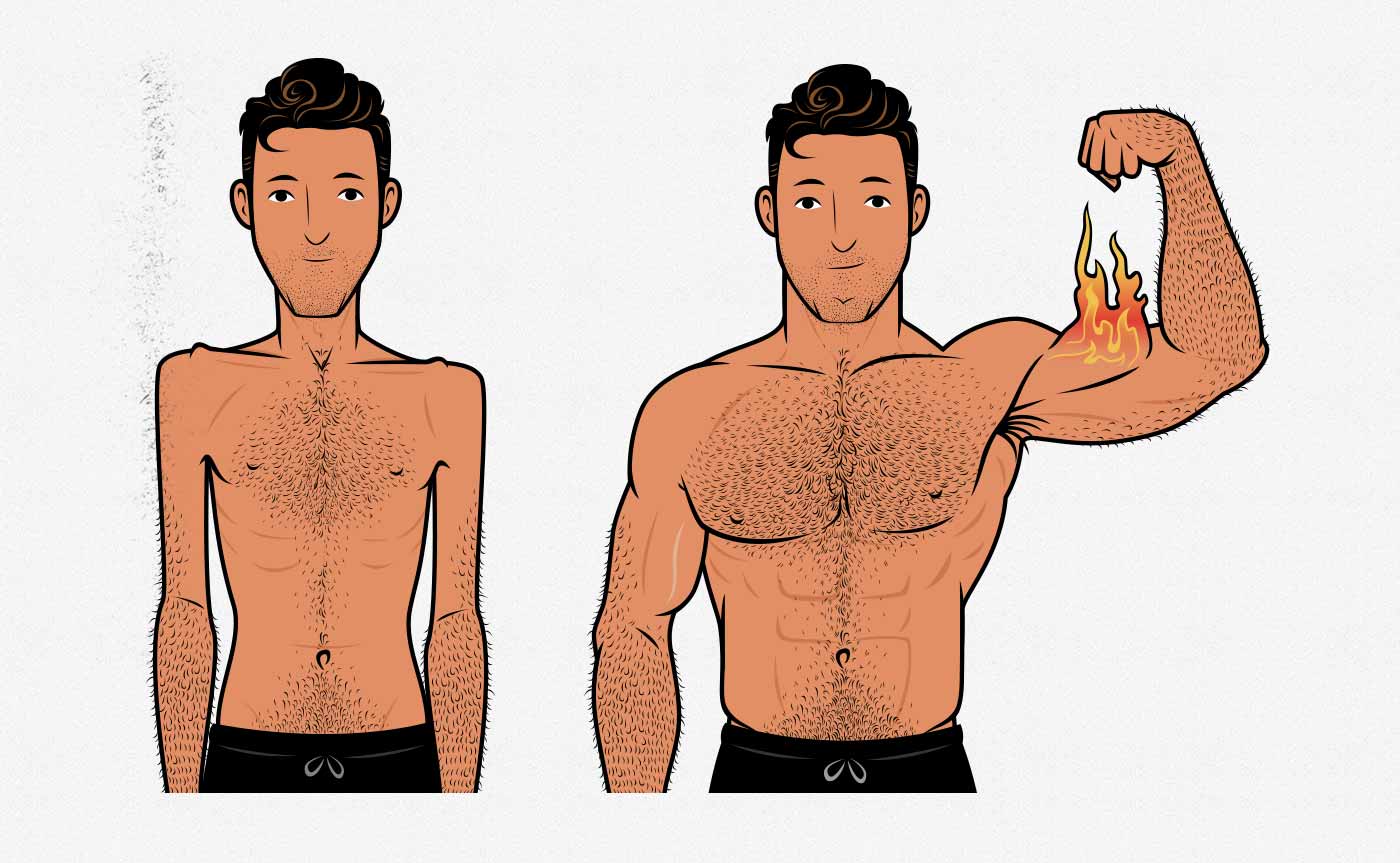
But a good bulking routine involves routinely lifting weights, eating a good diet, getting proper sleep, eating in a small calorie surplus, and maintaining a relatively low body-fat percentage while building muscle. All of those exercise, diet, and lifestyle habits are considered healthy by almost every major health organization.

